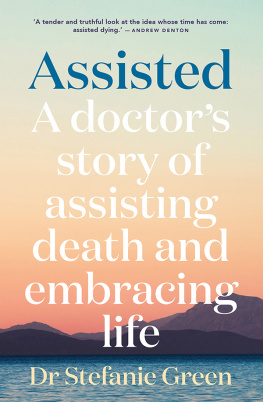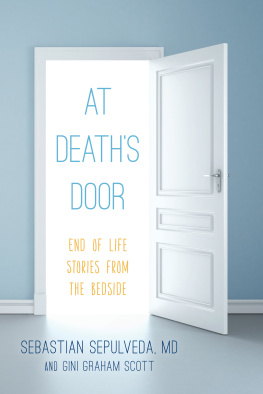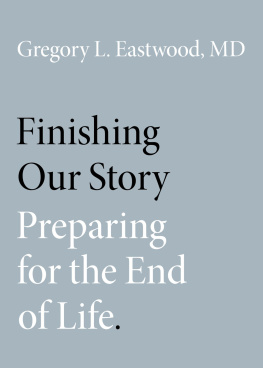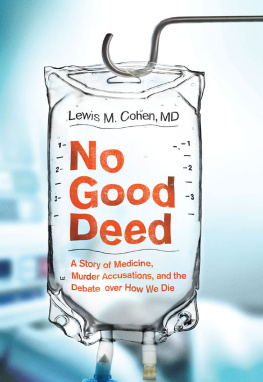A Dignified Ending


A Dignified Ending
Taking Control Over How We Die

Lewis Mitchel Cohen, MD
ROWMAN & LITTLEFIELD
Lanham Boulder New York London
Published by Rowman & Littlefield
An imprint of The Rowman & Littlefield Publishing Group, Inc.
4501 Forbes Boulevard, Suite 200, Lanham, Maryland 20706
www.rowman.com
6 Tinworth Street, London SE11 5AL, United Kingdom
Copyright 2019 by Lewis Mitchel Cohen
All rights reserved . No part of this book may be reproduced in any form or by any electronic or mechanical means, including information storage and retrieval systems, without written permission from the publisher, except by a reviewer who may quote passages in a review.
British Library Cataloguing in Publication Information Available
Library of Congress Cataloging-in-Publication Data Is Available
978-1-5381-1574-9 (cloth: alk. paper)
978-1-5381-1575-6 (electronic)
 The paper used in this publication meets the minimum requirements of American National Standard for Information SciencesPermanence of Paper for Printed Library Materials, ANSI/NISO Z39.48-1992.
The paper used in this publication meets the minimum requirements of American National Standard for Information SciencesPermanence of Paper for Printed Library Materials, ANSI/NISO Z39.48-1992.
Printed in the United States of America
Contents

Chapter 1.
Chapter 2.
Chapter 3.
Chapter 4.
Chapter 5.
Chapter 6.
Chapter 7.
Chapter 8.
Chapter 9.
Chapter 10.
Chapter 11.
Chapter 12.
Chapter 13.
Chapter 14.
Chapter 15.
Chapter 16.
Chapter 17.
Chapter 18.
Chapter 19.
Chapter 20.
Chapter 21.
Chapter 22.
Chapter 23.
Chapter 24.
Chapter 25.
Chapter 26.
Chapter 27.
Chapter 28.
Chapter 29.
Chapter 30.
Part I

D o you know how Hercules died? Dr. Paul Spiers asked.
We were sitting at a restaurant a block away from the courthouse in Worcester, Massachusetts. Paul was wolfing down a late lunch and talking between mouthfuls. I was taken aback by his questiona beauty of a non sequitur that hardly seemed germane to why we had gotten together.
Paul is a forensic psychologist who had just testified in court that morning as an expert witness. Back in the day, Paul was a leader of the Hemlock Society.
Paul could not know that before deciding on becoming a psychiatrist, I seriously considered the field of archeology and still recalled a few facts from mythology. As a child, I had excitedly read about the twelve Labors of Hercules (or Heracles as he was known to the ancient Greeks) in a juvenile version of Bulfinchs Mythology . However, even if I hadnt done my reading, just about everyone has heard of Hercules, the son of Zeus and mankinds mightiest hero.
Id be interested because? I replied.
Were talking about the original big guy, said Paul. Arguably the worlds greatest champion! And nobody remembers how he died. When Paul got agitated he squirmed around in his wheelchair. The tires squeaked under the table.
Paul began to expound: Hercules was not only a major deal in Greek and Roman times, but in the 1950s and 1960s there were literally nineteen Hercules movies produced. He single-handedly employed most of Hollywoods musclemen! Before Arnold Schwarzenegger hit it big and governed California, he starred in the improbably named picture, Hercules in New York . Lou Ferrigno, who became better known as televisions Hulk, was featured in two movies, and Dwayne Johnson, The Rock, had his turn in 2014. Who could forget Hercules against Karate , the 1973 saga set in Hong Kong? Or how about the 2012 soft-porn film with the titillating title, Hercules Unbound , promoted as being sexier than Game of Thrones ! Meaner than Spartacus ! Hercules is back! And for the kiddies, I can personally attest to the exceeding popularity of the Disney animated movie!
Paul took a drink, wiped his mouth, and returned to what was obviously a soliloquy.
But they were all eclipsed by the TV series, Hercules: The Legendary Journeys that paved the way for the even more popular, Xena: Warrior Princess .
I thought to myself, Spiers has been watching too much television and spending way too much time memorizing Wikipedia .
As he briefly rested from his own labors, Paul took a couple of self-satisfied bites.
So, how did Hercules die? I inquired.
Funny you should ask, he said, and wriggled his eyebrows like Groucho Marx.
None of the movies or TV series dealt with Herculess death, Paul began. Nowadays, not a lot of people recall Ovids poem, Metamorphoses , or Sophocless two plays, The Women of Trachis and Philoctetes , but all of them relate versions of the same strange tale. Herculess wife innocently gave him a tunic infused with a dreadful poison. Upon draping the garment over his torso, the toxin caused Herculess skin to begin melting. His blood hissed and boiled and the poison tore through his body like acid.
I remarked, It sounds not unlike the flesh-eating bacteria that some unlucky people pick up in hospitals nowadays.
Ignoring my comment as if I were an audience member who coughed during a performance, Paul pulled out a scrap of paper from his backpack and began dramatically reading aloud Ovids words: He tries at once to tear off the fatal clothing: where it is pulled away, it pulls skin away with it, and, revolting to tell, it either sticks to the limbs from which he tries in vain to remove it, or reveals the lacerated limbs and his massive bones.... He raises his hands to the heavens, crying: Death would be a gift to me.
Putting aside the paper, he continued: Hercules was a demigod and therefore practically immortal. That is a sizeable problem when your skin is grotesquely sloughing off. Seeking the counsel of the Delphic oracle, he learned that the only way to stop the agony was by dying in fire. Hercules persuaded Hyllus, his son, to construct a pyre of oak and olive wood, and to place his tortured body upon it. But he could not convince his son to set it ablaze.
Taking another look at his notes, Paul quoted from Sophocles: Hyllus said, Father, father, how can you? You are asking me to be your murderer, polluted with your blood. Hercules replied to him, No, I am not. I ask you to be my healer, or healer of my sufferings, sole physician of my pain.
Paul glanced at me and said, When it was apparent that Hyllus had done as much as he was willing, Hercules requested that another of his companions ignite the pyre.
The men who gathered around Hercules were his dearest friends. They loved him, uniformly admired his fortitude and had faced many dangers together. They heard his words and saw the torment but, like Hyllus, none was willing to comply with the request. Hercules implored them for help. Again, no one responded. Finally, Philoctetes, whom Homer describes as being the captain of seven ships and 350 oarsmen, brought out a burning torch and placed it upon the oil-soaked wood. As the smoke arose, Hercules declared his gratitude to Philoctetes and pronounced him to be the recipient of a magic bow and quiver of arrows.
And as the flames consumed Hercules, the demigod underwent an apotheosiswhile the shell of his body descended into the underground, he ascended to Mt. Olympus and took his rightful place among the other gods of the pantheon.
Who knew? I said. Assisted suicide in Greek mythology!
This book challenges the dogma that prolonging life through every means possible is the only reasonable response to a dire diagnosis and that it is unacceptable to embrace and shape our deaths. These views are predicated on a long-held misconception about our capacity to grasp the act of dying.
Next page









 The paper used in this publication meets the minimum requirements of American National Standard for Information SciencesPermanence of Paper for Printed Library Materials, ANSI/NISO Z39.48-1992.
The paper used in this publication meets the minimum requirements of American National Standard for Information SciencesPermanence of Paper for Printed Library Materials, ANSI/NISO Z39.48-1992.